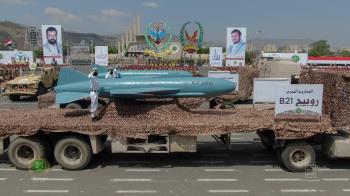Alwaght- Amid heated regional developments and on the eve of the new round of indirect talks between Iran and the US, a surprise visit to Saudi Arabia of Iran's Foreign Minister Abbas Araghchi has caught attention. The visit was not only made before his Oman visit for the new round of talks with the US, but also before Trump's expected visit to Riyadh, something giving it diplomatic and geopolitical aspects.
Meetings made and matters discussed
During his visit, Araghchi met and held talks with his Saudi counterpart Faisal bin Farhan. According to a statement released by the Iranian foreign ministry, the main topics of these consultations included pursuing the improvement of bilateral relations, reviewing the security situation in the region, and indirect negotiations between Tehran and Washington.
1. Boosting bilateral relations: Since resumption of diplomatic relations in 2023 with a Chinese mediation, the two sides put top on their agenda improving their ties in all areas including economy. In the visit, according to Iranian foreign ministry statement, the emphasis was on continuing cooperation in diplomacy, economy, and security, with Araghchi proposing activation of joint economic and cultural commissions. On the other side, bin Farhan in an official statement welcomed progress in bilateral ties, saying that "continuation of dialogue and regional interactions are the solutions to chronic tensions in the Middle East."
One of the most important developments in this area was the recent visit of Saudi Defense Minister Khalid bin Salman to Tehran and the presentation of a letter from the Saudi King Salman bin Abdulaziz to the Supreme Leader of the Islamic Revolution Ayatollah Sayyed Ali Khamenei, which showed that Riyadh is willing to upgrade the level of relations and develop cooperation. This meeting certainly promised the beginning of a new chapter in the historical relations between the two countries, during which we should witness an increase in political and diplomatic exchanges between them, and the possibility of starting joint projects in the fields of energy and maritime security, and increasing economic coordination within the framework of OPEC and the Organization of Islamic Cooperation (OIC).
2. Status of regional security; Persian Gulf and Red Sea: As official statements said, the security situation in the Persian Gulf and the Red Sea, especially with regard to Yemen conflict, was one of the important issues raised in the talks between Araghchi and Saudi officials. Iran and Saudi Arabia, as two regional powers with a historical role in the security arrangements of West Asia, despite sometimes deep differences on important regional issues but ultimately as two heavyweights in maintaining peace and stability in the region and especially the strategic the Persian Gulf, need to cooperate to maintain regional security based on common interests and without presence of foreign actors to prevent the repetition of the tragedies of the past decade in Syria, Iraq, Yemen, and Lebanon, which have only benefited actors with ill-wishes to friendly relations of regional nations, namely the US and Israel.
It should be taken into consideration that Gaza crisis and the need to counter the US-enabled Israeli crimes against the Palestinians is a top priority to the regional countries, especially Iran and Saudi Arabia, and that unity of Muslim countries can effectively contribute to warding off evil plots hatched by the US and Israeli regime against the Palestinian nation.
The benefits of cooperation between Tehran and Riyadh in this short period of time have shown their valuable results in ending Saudi-Yememi war, and have brought security to the Bab-el-Mandab Strait and the Red Sea for Saudi Arabia's shipping and oil exports, and pursuing investment projects on the Red Sea coast. Even though the Gaza crisis has spread to the Red Sea, the wise decision of Riyadh officials not to join the US war on aggression on Yemen has prevented negative impacts on the Arab kingdom's interests.
3. Indirect Iranian-American talks: The coincidence of the new round of indirect talks between Iran and the US in Muscat and the imminent visit of President Donald Trump to the region has gained media focus more than other issues.
The visit to Riyadh showed that in the negotiations, Iran tries to benefit from regional political support through coordination with regional countries. At the end of his trip, during a press conference in Jeddah, Araghchi held that “Saudi Arabia has an important role in the sustainability of any possible agreement, and coordination with Riyadh is a priority for us.” He also stressed that “any agreement that ignores the interests of the nations of the region will not be sustainable.”
Although Saudi Arabia does not have a direct role in the Muscat negotiations, it can play a role in facilitating them as a regional ally of the US, just as Riyadh showed interest in playing a mediating role during the Ukraine war.
Meanwhile, the more important issue is the message the Saudi hosting of Araghchi before Trump's visit can send out. The message is that Saudi Arabia wants to maintain a balance in its foreign policy. Riyadh wants to say that beside maintaining alliance with the West, it will pursue its relations with Tehran. Exchange of visits of high-ranking officials to Tehran and Riyadh in recent months has shown that a model of cooperation free from intervention of international powers is in the making. Relying less on the utter US support, Saudi Arabia is seeking to diversify its regional relations and Iran has a key place in this path.



























